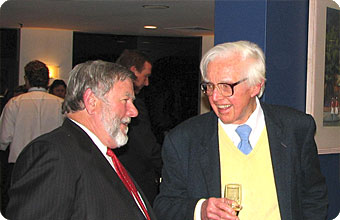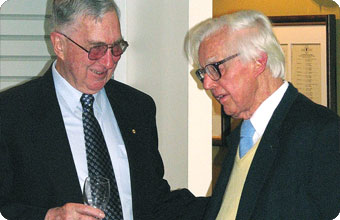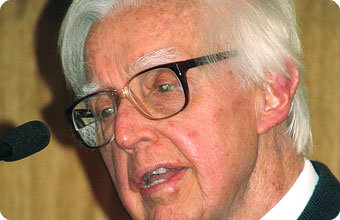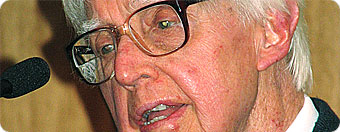Letter from The Hon. Sir Gerard Brennan AC KBE
Frank Glynn Connolly is a much loved member of the Queensland Bar. Not merely because he has continued in practice into his tenth decade, nor because he is a colourful figure — sometimes colourful in dress, frequently colourful in advocacy, and very frequently colourful in language. He is appreciated because he represents the best values of the Bar and has done so from the very beginning of his practice.
 Before the Second World War, Frank enrolled in Arts/Law and graduated with first class honours in English Literature from Queensland University. He temporarily diverted to Medicine. However, Max Julius spoke to him about the works of TS Eliot — then regarded as very avant-garde — and Frank decided to take the poet as the subject of a thesis. Then the war had intervened and Frank joined the 3rd Division as an anti-aircraft gunner. He finished his thesis, earned his M.A. and was commissioned. He served in Papua New Guinea. Later he volunteered for the British Army, serving in India and Malaysia. When the Pacific War ended, he was demobilized in London but then returned to complete his law degree. He graduated in 1949 and came to the Bar. But he had been captivated by the beauty and the power of language, and he continued to employ his talents in the writing of poetry which, for the most part, he has refused to publish. I imagine that, for Frank, one of the great attractions of the Bar must have been the opportunity and the ambience in which to indulge his love of the language. His literary interests were shared by his friend Austin Asche, and would have been welcomed by Kennedy Allen (whose Justices Acts became a classic), Vince Fogarty (the Balladist of the Bar) and others who delighted in the written and spoken word. Those of us who have heard Frank’s often florid eloquence as an advocate might be surprised by the disciplined elegance of his writing. A glimpse of his literary skill can be seen in two obituaries published in the 70th Anniversary book of the Law School. The lines he penned about Alexander Charles McNab and Chester James Parker are spare and moving tributes to dear friends.
Before the Second World War, Frank enrolled in Arts/Law and graduated with first class honours in English Literature from Queensland University. He temporarily diverted to Medicine. However, Max Julius spoke to him about the works of TS Eliot — then regarded as very avant-garde — and Frank decided to take the poet as the subject of a thesis. Then the war had intervened and Frank joined the 3rd Division as an anti-aircraft gunner. He finished his thesis, earned his M.A. and was commissioned. He served in Papua New Guinea. Later he volunteered for the British Army, serving in India and Malaysia. When the Pacific War ended, he was demobilized in London but then returned to complete his law degree. He graduated in 1949 and came to the Bar. But he had been captivated by the beauty and the power of language, and he continued to employ his talents in the writing of poetry which, for the most part, he has refused to publish. I imagine that, for Frank, one of the great attractions of the Bar must have been the opportunity and the ambience in which to indulge his love of the language. His literary interests were shared by his friend Austin Asche, and would have been welcomed by Kennedy Allen (whose Justices Acts became a classic), Vince Fogarty (the Balladist of the Bar) and others who delighted in the written and spoken word. Those of us who have heard Frank’s often florid eloquence as an advocate might be surprised by the disciplined elegance of his writing. A glimpse of his literary skill can be seen in two obituaries published in the 70th Anniversary book of the Law School. The lines he penned about Alexander Charles McNab and Chester James Parker are spare and moving tributes to dear friends.
Frank was taken into the Chambers of Reginald Raby Mulhall King, better known — though tautologically — as Rex King. Rex was a busy junior, later taking silk. He was a little idiosyncratic. After a wonderful party which Rex gave for the whole Bar at his Graceville home, he offered some of his guests one of his favourite records (the old graphite 78 rpm type) to chew. Brisbane dentists were surprised by the sudden appearance of an unusual substance in Barristers’ teeth! Next door to Rex on the first floor of the (very) old Inns of Court at 21 Adelaide Street was the legendary Dan Casey and the brilliant and ebullient Octy North. Frank availed himself of Dan’s advice when preparing his first criminal brief:
“Sir”, said Frank. “Don’t call me Sir,” replied Dan. “No, Sir, I won’t”, said Frank “but will you help me with this criminal brief?” “Of course, my boy! Sit down and tell me what the facts are”. “No, sir, I don’t need any help with the facts. I have read the depositions, there is a full statement in the brief and I have had a conference with the client”, Frank assured him. “Then what is the point of law, Frank?” asked Dan. “Oh,” said Frank, “I have been through Carter’s Criminal Code and all the notations to the section, so that is alright”. Dan was mystified. “Well what can I help you with?” he asked. “Sir”, said Frank “I thought you could help me with the b……t!”
 In those days, every barrister’s door was open and the newcomer was welcome to go into any chambers and seek advice or, at least, stimulating conversation. The practising Bar numbered less than 70 and each Barrister knew all the others. All but a few of the Brisbane Bar had chambers in the (very) old Inns of Court at 21 Adelaide Street. It was, I suppose, something of a closed circle but the advantage to a junior barrister learning the arts and skills of advocacy were enormous and the standards of the Bar were transmitted and rigorously maintained by a kind of osmotic pressure. Frank’s innate integrity was of a piece with the standards of the Bar from which he has never departed.
In those days, every barrister’s door was open and the newcomer was welcome to go into any chambers and seek advice or, at least, stimulating conversation. The practising Bar numbered less than 70 and each Barrister knew all the others. All but a few of the Brisbane Bar had chambers in the (very) old Inns of Court at 21 Adelaide Street. It was, I suppose, something of a closed circle but the advantage to a junior barrister learning the arts and skills of advocacy were enormous and the standards of the Bar were transmitted and rigorously maintained by a kind of osmotic pressure. Frank’s innate integrity was of a piece with the standards of the Bar from which he has never departed.
In the late 40’s and early 50’s, some of the bread and butter of the junior Bar were briefs for plaintiffs in undefended divorces, at a fairly standard fee of 10 guineas. This was before the introduction of “no fault” divorce. Frank did not believe in divorce. So, despite the financial loss, Frank declined to accept briefs to sever the marriage bond. In time, other briefs arrived and he was able to leave Rex’s chambers and move up to a vacant room on the third floor. It was a small and cohesive group and Frank’s ebullient presence contributed greatly to the friendships that were formed. His practice grew as his devoted, often passionate, advocacy was much respected. Hyperbole there may have been, but never a submission that was dishonourable. There were, of course, many occasions when Frank assured us that he was acting for the most misunderstood and decent client who had ever been wrongly prosecuted or sued!
He has seen many changes at the Bar. The District Court was re-established, the Brisbane Bar combined to move from their old chambers to the boot factory at 107 North Quay, the old Supreme Court was burnt down and its site redeveloped piece by piece, the Family, Federal, and Federal Magistrates Courts have been established and the Bar has vastly increased in numbers. The Bar consisted almost entirely of Anglo-Celtic men when Frank commenced practice; today the Queensland Bar is numbered in the hundreds, is multi-racial and is enriched by the contributions of both sexes. Judges have come and gone in increasing numbers, new areas of work have opened up and the pattern of work has changed. The income of the Bar has vastly increased. The doors on chambers are no longer always open. Frank would not have been daunted by these changes. His warm personality would have welcomed the newcomers; his criteria for evaluating the judiciary would not have altered; the indicia of affluence would have left him unmoved. Throughout it all, he would have been true to his vision of the Bar as the defender of individual rights, particularly in the criminal jurisdiction. Uncompromising in the honest defence of his client’s interests, utilizing to the maximum his command of the language and his knowledge of human nature, revelling in the camaraderie and conversations of the Bar, he has been an exemplar of the values of the profession. A “Rumpole of the Bailey”? I think not. His soul is too gentle and his devotion to his beloved Mary, their children and their children’s children too unconditional for comparison with the bravado of Rumpole.
Throughout the years, Frank has attracted and been blessed by many friendships. Even if his friends were alienated from each other, I doubt that any was ever alienated from Frank. Some friends were great and powerful, some were the rejected and derelict. He rejoiced in them all. Notably, advancing age did not diminish his interest in and willingness to help newcomers to the Bar who shared his passion for equal justice. But it would mistake the essential character of the man to judge him solely by his professional career.
At heart, he is a soft-hearted romantic. Indeed, did he not elope with his beloved Mary? And his charity could be attested by the hundreds who benefited from his work as a member of the St Vincent de Paul Society. One of them, a far-seeing but destitute alcoholic, left a will in which he named Frank as his executor to arrange his funeral. His work as a Vincentian was, of course, a manifestation of his simple but profound Christian faith — the ultimate explanation of this gentle character.
The Bar has been greatly enriched by his presence. If it is true that he has decided to give up practice, he will be missed by colleagues, by courts and by clients. Those of us who have been privileged to know him assure him of our love. As he devotes himself more assiduously to the writing of poetry, we wish him much satisfaction in the endeavour. One day, he may even be prevailed on to publish ….. Another poet, Hilaire Belloc, has a verse that reflects something of Frank’s values:
From quiet homes and first beginning
Out to the undiscovered ends,
There’s nothing worth the wear of winning,
But laughter and the love of friends.
Letter from The Hon. Austin Asche AC, QC
Thank you for sending me the piece on Frank Connolly. A delightful man to know, and you have captured him well.
His forensic style was old-fashioned even in our day, and I don’t expect anyone could adopt it now, or get away with it if they did. With Frank, it worked. I don’t suppose juries always understood everything he said, but they did grasp the passionate intensity.
Frank’s geese always turned into swans. I was always fascinated, when he had some particularly unsavoury client, to hear from Frank what a fine citizen the person really was, nobly suffering the unjust slurs cast on his reputation. But the important thing was that Frank never allowed his eloquence to carry him away from the salient points of the case. He was an excellent advocate.
As you and I well know he was as passionate outside court as inside, and we were all introduced to Frank’s various enthusiasms as he discovered them.
I like to think that I was some support to him when it came to poetry, because we were both under the spell of T.S. Eliot, then the darling of the avant garde. (I wasn’t so struck on Ezra Pound, who was Frank’s other great hero).
Frank certainly needed some support in this field, because he came against the withering scorn of Graham Hart and Rex King. For Graham, poetry stopped at Tennyson. Rex was prepared to go a little further to A. E. Housman. But, for both, anything later was meaningless drivel; and I need not remind you that neither Graham nor Rex were backward or tactful in expressing their views. (Dear old Kennedy Allen – two doors down – of course, never got beyond Homer and Virgil; and I rather suspect he thought Horace was a little too advanced for serious consideration).
So I struck up a great friendship with Frank and many times we,
“tired the sun with talking
And sent him down the sky.”
(Admittedly most of the talking was done by Frank, but I managed to get a word in occasionally).
He was a great companion, warm-hearted, generous and full of tremendous zest for whatever subject he was taking about.
I last saw him about four years ago, but he was quite unchanged. I was delighted to hear from you that he is still going strong, and I will try to see him next time I visit Brisbane; which I do occasionally, since my son and his family live there.
 No doubt we all tend to paint rosy pictures of the past, but I am convinced that there never was a Bar as colourful as that in Brisbane in the early fifties. My explanation is twofold. First, there was a strong Irish element with the Irish love of talk, literature, laughter and blarney. Secondly, with some exceptions, most had practices which allowed many days out of court to roam the chambers or repair to the hostelries. Reprehensible traits, no doubt, for the serious minded. But what talk! And what characters! Dan Casey, Octy North, Graham Hart, Rex King, Kennedy Allen, Vince Fogarty, Jim Douglas, etc., and, of course, Frank himself. We should write about them one day.
No doubt we all tend to paint rosy pictures of the past, but I am convinced that there never was a Bar as colourful as that in Brisbane in the early fifties. My explanation is twofold. First, there was a strong Irish element with the Irish love of talk, literature, laughter and blarney. Secondly, with some exceptions, most had practices which allowed many days out of court to roam the chambers or repair to the hostelries. Reprehensible traits, no doubt, for the serious minded. But what talk! And what characters! Dan Casey, Octy North, Graham Hart, Rex King, Kennedy Allen, Vince Fogarty, Jim Douglas, etc., and, of course, Frank himself. We should write about them one day.
I still meet delightful people in the law, but, on the whole, they seem frantically busy these days, and far too many have become far too serious. I fear the Grisham blight. His novels are good reading, though somewhat formulaic – honest, idealistic, young lawyer challenges cabal of sinister old practitioners working secretly for some evil corporation – that sort of thing. But what the books continually emphasise is this remorseless demand that every lawyer must earn – and record that he earns – a set amount of dollars per hour. (I don’t think this is what Kipling means when he talks about “the unforgiving minute”). Clearly such irrelevancies as Shakespeare and Co. must be banished; and, indeed, mention of them would stamp one as seriously deviant, and a bad employment – or briefing – risk. Frank would not appreciate or be appreciated.
Discuss this item on the Hearsay Forum




 Before the Second World War, Frank enrolled in Arts/Law and graduated with first class honours in English Literature from Queensland University. He temporarily diverted to Medicine. However, Max Julius spoke to him about the works of TS Eliot — then regarded as very avant-garde — and Frank decided to take the poet as the subject of a thesis. Then the war had intervened and Frank joined the 3rd Division as an anti-aircraft gunner. He finished his thesis, earned his M.A. and was commissioned. He served in Papua New Guinea. Later he volunteered for the British Army, serving in India and Malaysia. When the Pacific War ended, he was demobilized in London but then returned to complete his law degree. He graduated in 1949 and came to the Bar. But he had been captivated by the beauty and the power of language, and he continued to employ his talents in the writing of poetry which, for the most part, he has refused to publish. I imagine that, for Frank, one of the great attractions of the Bar must have been the opportunity and the ambience in which to indulge his love of the language. His literary interests were shared by his friend Austin Asche, and would have been welcomed by Kennedy Allen (whose Justices Acts became a classic), Vince Fogarty (the Balladist of the Bar) and others who delighted in the written and spoken word. Those of us who have heard Frank’s often florid eloquence as an advocate might be surprised by the disciplined elegance of his writing. A glimpse of his literary skill can be seen in two obituaries published in the 70th Anniversary book of the Law School. The lines he penned about Alexander Charles McNab and Chester James Parker are spare and moving tributes to dear friends.
Before the Second World War, Frank enrolled in Arts/Law and graduated with first class honours in English Literature from Queensland University. He temporarily diverted to Medicine. However, Max Julius spoke to him about the works of TS Eliot — then regarded as very avant-garde — and Frank decided to take the poet as the subject of a thesis. Then the war had intervened and Frank joined the 3rd Division as an anti-aircraft gunner. He finished his thesis, earned his M.A. and was commissioned. He served in Papua New Guinea. Later he volunteered for the British Army, serving in India and Malaysia. When the Pacific War ended, he was demobilized in London but then returned to complete his law degree. He graduated in 1949 and came to the Bar. But he had been captivated by the beauty and the power of language, and he continued to employ his talents in the writing of poetry which, for the most part, he has refused to publish. I imagine that, for Frank, one of the great attractions of the Bar must have been the opportunity and the ambience in which to indulge his love of the language. His literary interests were shared by his friend Austin Asche, and would have been welcomed by Kennedy Allen (whose Justices Acts became a classic), Vince Fogarty (the Balladist of the Bar) and others who delighted in the written and spoken word. Those of us who have heard Frank’s often florid eloquence as an advocate might be surprised by the disciplined elegance of his writing. A glimpse of his literary skill can be seen in two obituaries published in the 70th Anniversary book of the Law School. The lines he penned about Alexander Charles McNab and Chester James Parker are spare and moving tributes to dear friends.  In those days, every barrister’s door was open and the newcomer was welcome to go into any chambers and seek advice or, at least, stimulating conversation. The practising Bar numbered less than 70 and each Barrister knew all the others. All but a few of the Brisbane Bar had chambers in the (very) old Inns of Court at 21 Adelaide Street. It was, I suppose, something of a closed circle but the advantage to a junior barrister learning the arts and skills of advocacy were enormous and the standards of the Bar were transmitted and rigorously maintained by a kind of osmotic pressure. Frank’s innate integrity was of a piece with the standards of the Bar from which he has never departed.
In those days, every barrister’s door was open and the newcomer was welcome to go into any chambers and seek advice or, at least, stimulating conversation. The practising Bar numbered less than 70 and each Barrister knew all the others. All but a few of the Brisbane Bar had chambers in the (very) old Inns of Court at 21 Adelaide Street. It was, I suppose, something of a closed circle but the advantage to a junior barrister learning the arts and skills of advocacy were enormous and the standards of the Bar were transmitted and rigorously maintained by a kind of osmotic pressure. Frank’s innate integrity was of a piece with the standards of the Bar from which he has never departed.  No doubt we all tend to paint rosy pictures of the past, but I am convinced that there never was a Bar as colourful as that in Brisbane in the early fifties. My explanation is twofold. First, there was a strong Irish element with the Irish love of talk, literature, laughter and blarney. Secondly, with some exceptions, most had practices which allowed many days out of court to roam the chambers or repair to the hostelries. Reprehensible traits, no doubt, for the serious minded. But what talk! And what characters! Dan Casey, Octy North, Graham Hart, Rex King, Kennedy Allen, Vince Fogarty, Jim Douglas, etc., and, of course, Frank himself. We should write about them one day.
No doubt we all tend to paint rosy pictures of the past, but I am convinced that there never was a Bar as colourful as that in Brisbane in the early fifties. My explanation is twofold. First, there was a strong Irish element with the Irish love of talk, literature, laughter and blarney. Secondly, with some exceptions, most had practices which allowed many days out of court to roam the chambers or repair to the hostelries. Reprehensible traits, no doubt, for the serious minded. But what talk! And what characters! Dan Casey, Octy North, Graham Hart, Rex King, Kennedy Allen, Vince Fogarty, Jim Douglas, etc., and, of course, Frank himself. We should write about them one day.